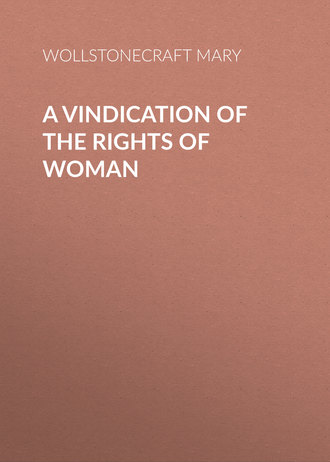 полная версия
полная версияA Vindication of the Rights of Woman
In a seraglio, I grant, that all these arts are necessary; the epicure must have his palate tickled, or he will sink into apathy; but have women so little ambition as to be satisfied with such a condition? Can they supinely dream life away in the lap of pleasure, or in the languor of weariness, rather than assert their claim to pursue reasonable pleasures, and render themselves conspicuous, by practising the virtues which dignify mankind? Surely she has not an immortal soul who can loiter life away, merely employed to adorn her person, that she may amuse the languid hours, and soften the cares of a fellow-creature who is willing to be enlivened by her smiles and tricks, when the serious business of life is over.
Besides, the woman who strengthens her body and exercises her mind will, by managing her family and practising various virtues, become the friend, and not the humble dependent of her husband; and if she deserves his regard by possessing such substantial qualities, she will not find it necessary to conceal her affection, nor to pretend to an unnatural coldness of constitution to excite her husband's passions. In fact, if we revert to history, we shall find that the women who have distinguished themselves have neither been the most beautiful nor the most gentle of their sex.
Nature, or to speak with strict propriety God, has made all things right; but man has sought him out many inventions to mar the work. I now allude to that part of Dr. Gregory's treatise, where he advises a wife never to let her husband know the extent of her sensibility or affection. Voluptuous precaution; and as ineffectual as absurd. Love, from its very nature, must be transitory. To seek for a secret that would render it constant, would be as wild a search as for the philosopher's stone, or the grand panacea; and the discovery would be equally useless, or rather pernicious to mankind. The most holy band of society is friendship. It has been well said, by a shrewd satirist, "that rare as true love is, true friendship is still rarer."
This is an obvious truth, and the cause not lying deep, will not elude a slight glance of inquiry.
Love, the common passion, in which chance and sensation take place of choice and reason, is in some degree, felt by the mass of mankind; for it is not necessary to speak, at present, of the emotions that rise above or sink below love. This passion, naturally increased by suspense and difficulties, draws the mind out of its accustomed state, and exalts the affections; but the security of marriage, allowing the fever of love to subside, a healthy temperature is thought insipid, only by those who have not sufficient intellect to substitute the calm tenderness of friendship, the confidence of respect, instead of blind admiration, and the sensual emotions of fondness.
This is, must be, the course of nature—friendship or indifference inevitably succeeds love. And this constitution seems perfectly to harmonize with the system of government which prevails in the moral world. Passions are spurs to action, and open the mind; but they sink into mere appetites, become a personal momentary gratification, when the object is gained, and the satisfied mind rests in enjoyment. The man who had some virtue whilst he was struggling for a crown, often becomes a voluptuous tyrant when it graces his brow; and, when the lover is not lost in the husband, the dotard a prey to childish caprices, and fond jealousies, neglects the serious duties of life, and the caresses which should excite confidence in his children are lavished on the overgrown child, his wife.
In order to fulfil the duties of life, and to be able to pursue with vigour the various employments which form the moral character, a master and mistress of a family ought not to continue to love each other with passion. I mean to say, that they ought not to indulge those emotions which disturb the order of society, and engross the thoughts that should be otherwise employed. The mind that has never been engrossed by one object wants vigour—if it can long be so, it is weak.
A mistaken education, a narrow, uncultivated mind, and many sexual prejudices, tend to make women more constant than men; but, for the present, I shall not touch on this branch of the subject. I will go still further, and advance, without dreaming of a paradox, that an unhappy marriage is often very advantageous to a family, and that the neglected wife is, in general, the best mother. And this would almost always be the consequence, if the female mind was more enlarged; for, it seems to be the common dispensation of Providence, that what we gain in present enjoyment should be deducted from the treasure of life, experience; and that when we are gathering the flowers of the day and revelling in pleasure, the solid fruit of toil and wisdom should not be caught at the same time. The way lies before us, we must turn to the right or left; and he who will pass life away in bounding from one pleasure to another, must not complain if he neither acquires wisdom nor respectability of character.
Supposing for a moment, that the soul is not immortal, and that man was only created for the present scene; I think we should have reason to complain that love, infantine fondness, ever grew insipid and palled upon the sense. Let us eat, drink, and love, for to-morrow we die, would be in fact the language of reason, the morality of life; and who but a fool would part with a reality for a fleeting shadow? But, if awed by observing the improvable powers of the mind, we disdain to confine our wishes or thoughts to such a comparatively mean field of action; that only appears grand and important as it is connected with a boundless prospect and sublime hopes; what necessity is there for falsehood in conduct, and why must the sacred majesty of truth be violated to detain a deceitful good that saps the very foundation of virtue? Why must the female mind be tainted by coquetish arts to gratify the sensualist, and prevent love from subsiding into friendship or compassionate tenderness, when there are not qualities on which friendship can be built? Let the honest heart show itself, and REASON teach passion to submit to necessity; or, let the dignified pursuit of virtue and knowledge raise the mind above those emotions which rather imbitter than sweeten the cup of life, when they are not restrained within due bounds.
I do not mean to allude to the romantic passion, which is the concomitant of genius. Who can clip its wings? But that grand passion not proportioned to the puny enjoyments of life, is only true to the sentiment, and feeds on itself. The passions which have been celebrated for their durability have always been unfortunate. They have acquired strength by absence and constitutional melancholy. The fancy has hovered round a form of beauty dimly seen—but familiarity might have turned admiration into disgust; or, at least, into indifference, and allowed the imagination leisure to start fresh game. With perfect propriety, according to this view of things, does Rousseau make the mistress of his soul, Eloisa, love St. Preux, when life was fading before her; but this is no proof of the immortality of the passion.
Of the same complexion is Dr. Gregory's advice respecting delicacy of sentiment, which he advises a woman not to acquire, if she has determined to marry. This determination, however, perfectly consistent with his former advice, he calls INDELICATE, and earnestly persuades his daughters to conceal it, though it may govern their conduct: as if it were indelicate to have the common appetites of human nature.
Noble morality! and consistent with the cautious prudence of a little soul that cannot extend its views beyond the present minute division of existence. If all the faculties of woman's mind are only to be cultivated as they respect her dependence on man; if, when she obtains a husband she has arrived at her goal, and meanly proud, is satisfied with such a paltry crown, let her grovel contentedly, scarcely raised by her employments above the animal kingdom; but, if she is struggling for the prize of her high calling, let her cultivate her understanding without stopping to consider what character the husband may have whom she is destined to marry. Let her only determine, without being too anxious about present happiness, to acquire the qualities that ennoble a rational being, and a rough, inelegant husband may shock her taste without destroying her peace of mind. She will not model her soul to suit the frailties of her companion, but to bear with them: his character may be a trial, but not an impediment to virtue.
If Dr. Gregory confined his remark to romantic expectations of constant love and congenial feelings, he should have recollected, that experience will banish what advice can never make us cease to wish for, when the imagination is kept alive at the expence of reason.
I own it frequently happens, that women who have fostered a romantic unnatural delicacy of feeling, waste their lives in IMAGINING how happy they should have been with a husband who could love them with a fervid increasing affection every day, and all day. But they might as well pine married as single, and would not be a jot more unhappy with a bad husband than longing for a good one. That a proper education; or, to speak with more precision, a well stored mind, would enable a woman to support a single life with dignity, I grant; but that she should avoid cultivating her taste, lest her husband should occasionally shock it, is quitting a substance for a shadow. To say the truth, I do not know of what use is an improved taste, if the individual be not rendered more independent of the casualties of life; if new sources of enjoyment, only dependent on the solitary operations of the mind, are not opened. People of taste, married or single, without distinction, will ever be disgusted by various things that touch not less observing minds. On this conclusion the argument must not be allowed to hinge; but in the whole sum of enjoyment is taste to be denominated a blessing?
The question is, whether it procures most pain or pleasure? The answer will decide the propriety of Dr. Gregory's advice, and show how absurd and tyrannic it is thus to lay down a system of slavery; or to attempt to educate moral beings by any other rules than those deduced from pure reason, which apply to the whole species.
Gentleness of manners, forbearance, and long suffering, are such amiable godlike qualities, that in sublime poetic strains the Deity has been invested with them; and, perhaps, no representation of his goodness so strongly fastens on the human affections as those that represent him abundant in mercy and willing to pardon. Gentleness, considered in this point of view, bears on its front all the characteristics of grandeur, combined with the winning graces of condescension; but what a different aspect it assumes when it is the submissive demeanour of dependence, the support of weakness that loves, because it wants protection; and is forbearing, because it must silently endure injuries; smiling under the lash at which it dare not snarl. Abject as this picture appears, it is the portrait of an accomplished woman, according to the received opinion of female excellence, separated by specious reasoners from human excellence. Or, they (Vide Rousseau, and Swedenborg) kindly restore the rib, and make one moral being of a man and woman; not forgetting to give her all the "submissive charms."
How women are to exist in that state where there is to be neither marrying nor giving in marriage, we are not told. For though moralists have agreed, that the tenor of life seems to prove that MAN is prepared by various circumstances for a future state, they constantly concur in advising WOMAN only to provide for the present. Gentleness, docility, and a spaniel-like affection are, on this ground, consistently recommended as the cardinal virtues of the sex; and, disregarding the arbitrary economy of nature, one writer has declared that it is masculine for a woman to be melancholy. She was created to be the toy of man, his rattle, and it must jingle in his ears, whenever, dismissing reason, he chooses to be amused.
To recommend gentleness, indeed, on a broad basis is strictly philosophical. A frail being should labour to be gentle. But when forbearance confounds right and wrong, it ceases to be a virtue; and, however convenient it may be found in a companion, that companion will ever be considered as an inferior, and only inspire a vapid tenderness, which easily degenerates into contempt. Still, if advice could really make a being gentle, whose natural disposition admitted not of such a fine polish, something toward the advancement of order would be attained; but if, as might quickly be demonstrated, only affectation be produced by this indiscriminate counsel, which throws a stumbling block in the way of gradual improvement, and true melioration of temper, the sex is not much benefited by sacrificing solid virtues to the attainment of superficial graces, though for a few years they may procure the individual's regal sway.
As a philosopher, I read with indignation the plausible epithets which men use to soften their insults; and, as a moralist, I ask what is meant by such heterogeneous associations, as fair defects, amiable weaknesses, etc.? If there is but one criterion of morals, but one archetype for man, women appear to be suspended by destiny, according to the vulgar tale of Mahomet's coffin; they have neither the unerring instinct of brutes, nor are allowed to fix the eye of reason on a perfect model. They were made to be loved, and must not aim at respect, lest they should be hunted out of society as masculine.
But to view the subject in another point of view. Do passive indolent women make the best wives? Confining our discussion to the present moment of existence, let us see how such weak creatures perform their part? Do the women who, by the attainment of a few superficial accomplishments, have strengthened the prevailing prejudice, merely contribute to the happiness of their husbands? Do they display their charms merely to amuse them? And have women, who have early imbibed notions of passive obedience, sufficient character to manage a family or educate children? So far from it, that, after surveying the history of woman, I cannot help agreeing with the severest satirist, considering the sex as the weakest as well as the most oppressed half of the species. What does history disclose but marks of inferiority, and how few women have emancipated themselves from the galling yoke of sovereign man? So few, that the exceptions remind me of an ingenious conjecture respecting Newton: that he was probably a being of a superior order, accidentally caged in a human body. In the same style I have been led to imagine that the few extraordinary women who have rushed in eccentrical directions out of the orbit prescribed to their sex, were MALE spirits, confined by mistake in a female frame. But if it be not philosophical to think of sex when the soul is mentioned, the inferiority must depend on the organs; or the heavenly fire, which is to ferment the clay, is not given in equal portions.
But avoiding, as I have hitherto done, any direct comparison of the two sexes collectively, or frankly acknowledging the inferiority of woman, according to the present appearance of things, I shall only insist, that men have increased that inferiority till women are almost sunk below the standard of rational creatures. Let their faculties have room to unfold, and their virtues to gain strength, and then determine where the whole sex must stand in the intellectual scale. Yet, let it be remembered, that for a small number of distinguished women I do not ask a place.
It is difficult for us purblind mortals to say to what height human discoveries and improvements may arrive, when the gloom of despotism subsides, which makes us stumble at every step; but, when morality shall be settled on a more solid basis, then, without being gifted with a prophetic spirit, I will venture to predict, that woman will be either the friend or slave of man. We shall not, as at present, doubt whether she is a moral agent, or the link which unites man with brutes. But, should it then appear, that like the brutes they were principally created for the use of man, he will let them patiently bite the bridle, and not mock them with empty praise; or, should their rationality be proved, he will not impede their improvement merely to gratify his sensual appetites. He will not with all the graces of rhetoric, advise them to submit implicitly their understandings to the guidance of man. He will not, when he treats of the education of women, assert, that they ought never to have the free use of reason, nor would he recommend cunning and dissimulation to beings who are acquiring, in like manner as himself, the virtues of humanity.
Surely there can be but one rule of right, if morality has an eternal foundation, and whoever sacrifices virtue, strictly so called, to present convenience, or whose DUTY it is to act in such a manner, lives only for the passing day, and cannot be an accountable creature.
The poet then should have dropped his sneer when he says,
"If weak women go astray,The stars are more in fault than they."For that they are bound by the adamantine chain of destiny is most certain, if it be proved that they are never to exercise their own reason, never to be independent, never to rise above opinion, or to feel the dignity of a rational will that only bows to God, and often forgets that the universe contains any being but itself, and the model of perfection to which its ardent gaze is turned, to adore attributes that, softened into virtues, may be imitated in kind, though the degree overwhelms the enraptured mind.
If, I say, for I would not impress by declamation when reason offers her sober light, if they are really capable of acting like rational creatures, let them not be treated like slaves; or, like the brutes who are dependent on the reason of man, when they associate with him; but cultivate their minds, give them the salutary, sublime curb of principle, and let them attain conscious dignity by feeling themselves only dependent on God. Teach them, in common with man, to submit to necessity, instead of giving, to render them more pleasing, a sex to morals.
Further, should experience prove that they cannot attain the same degree of strength of mind, perseverance and fortitude, let their virtues be the same in kind, though they may vainly struggle for the same degree; and the superiority of man will be equally clear, if not clearer; and truth, as it is a simple principle, which admits of no modification, would be common to both. Nay, the order of society, as it is at present regulated, would not be inverted, for woman would then only have the rank that reason assigned her, and arts could not be practised to bring the balance even, much less to turn it.
These may be termed Utopian dreams. Thanks to that Being who impressed them on my soul, and gave me sufficient strength of mind to dare to exert my own reason, till becoming dependent only on him for the support of my virtue, I view with indignation, the mistaken notions that enslave my sex.
I love man as my fellow; but his sceptre real or usurped, extends not to me, unless the reason of an individual demands my homage; and even then the submission is to reason, and not to man. In fact, the conduct of an accountable being must be regulated by the operations of its own reason; or on what foundation rests the throne of God?
It appears to me necessary to dwell on these obvious truths, because females have been insulted, as it were; and while they have been stripped of the virtues that should clothe humanity, they have been decked with artificial graces, that enable them to exercise a short lived tyranny. Love, in their bosoms, taking place of every nobler passion, their sole ambition is to be fair, to raise emotion instead of inspiring respect; and this ignoble desire, like the servility in absolute monarchies, destroys all strength of character. Liberty is the mother of virtue, and if women are, by their very constitution, slaves, and not allowed to breathe the sharp invigorating air of freedom, they must ever languish like exotics, and be reckoned beautiful flaws in nature; let it also be remembered, that they are the only flaw.
As to the argument respecting the subjection in which the sex has ever been held, it retorts on man. The many have always been enthralled by the few; and, monsters who have scarcely shown any discernment of human excellence, have tyrannized over thousands of their fellow creatures. Why have men of superior endowments submitted to such degradation? For, is it not universally acknowledged that kings, viewed collectively, have ever been inferior, in abilities and virtue, to the same number of men taken from the common mass of mankind—yet, have they not, and are they not still treated with a degree of reverence, that is an insult to reason? China is not the only country where a living man has been made a God. MEN have submitted to superior strength, to enjoy with impunity the pleasure of the moment—WOMEN have only done the same, and therefore till it is proved that the courtier, who servilely resigns the birthright of a man, is not a moral agent, it cannot be demonstrated that woman is essentially inferior to man, because she has always been subjugated.
Brutal force has hitherto governed the world, and that the science of politics is in its infancy, is evident from philosophers scrupling to give the knowledge most useful to man that determinate distinction.
I shall not pursue this argument any further than to establish an obvious inference, that as sound politics diffuse liberty, mankind, including woman, will become more wise and virtuous.
CHAPTER 3.
THE SAME SUBJECT CONTINUED
Bodily strength from being the distinction of heroes is now sunk into such unmerited contempt, that men as well as women, seem to think it unnecessary: the latter, as it takes from their feminine graces, and from that lovely weakness, the source of their undue power; and the former, because it appears inimical with the character of a gentleman.
That they have both by departing from one extreme run into another, may easily be proved; but it first may be proper to observe, that a vulgar error has obtained a degree of credit, which has given force to a false conclusion, in which an effect has been mistaken for a cause.
People of genius have, very frequently, impaired their constitutions by study, or careless inattention to their health, and the violence of their passions bearing a proportion to the vigour of their intellects, the sword's destroying the scabbard has become almost proverbial, and superficial observers have inferred from thence, that men of genius have commonly weak, or to use a more fashionable phrase, delicate constitutions. Yet the contrary, I believe, will appear to be the fact; for, on diligent inquiry, I find that strength of mind has, in most cases, been accompanied by superior strength of body, natural soundness of constitution, not that robust tone of nerves and vigour of muscles, which arise from bodily labour, when the mind is quiescent, or only directs the hands.
Dr. Priestley has remarked, in the preface to his biographical chart, that the majority of great men have lived beyond forty-five. And, considering the thoughtless manner in which they lavished their strength, when investigating a favourite science, they have wasted the lamp of life, forgetful of the midnight hour; or, when, lost in poetic dreams, fancy has peopled the scene, and the soul has been disturbed, till it shook the constitution, by the passions that meditation had raised; whose objects, the baseless fabric of a vision, faded before the exhausted eye, they must have had iron frames. Shakespeare never grasped the airy dagger with a nerveless hand, nor did Milton tremble when he led Satan far from the confines of his dreary prison. These were not the ravings of imbecility, the sickly effusions of distempered brains; but the exuberance of fancy, that "in a fine phrenzy" wandering, was not continually reminded of its material shackles.
I am aware, that this argument would carry me further than it may be supposed I wish to go; but I follow truth, and still adhering to my first position, I will allow that bodily strength seems to give man a natural superiority over woman; and this is the only solid basis on which the superiority of the sex can be built. But I still insist, that not only the virtue, but the KNOWLEDGE of the two sexes should be the same in nature, if not in degree, and that women, considered not only as moral, but rational creatures, ought to endeavour to acquire human virtues (or perfections) by the SAME means as men, instead of being educated like a fanciful kind of HALF being, one of Rousseau's wild chimeras.






